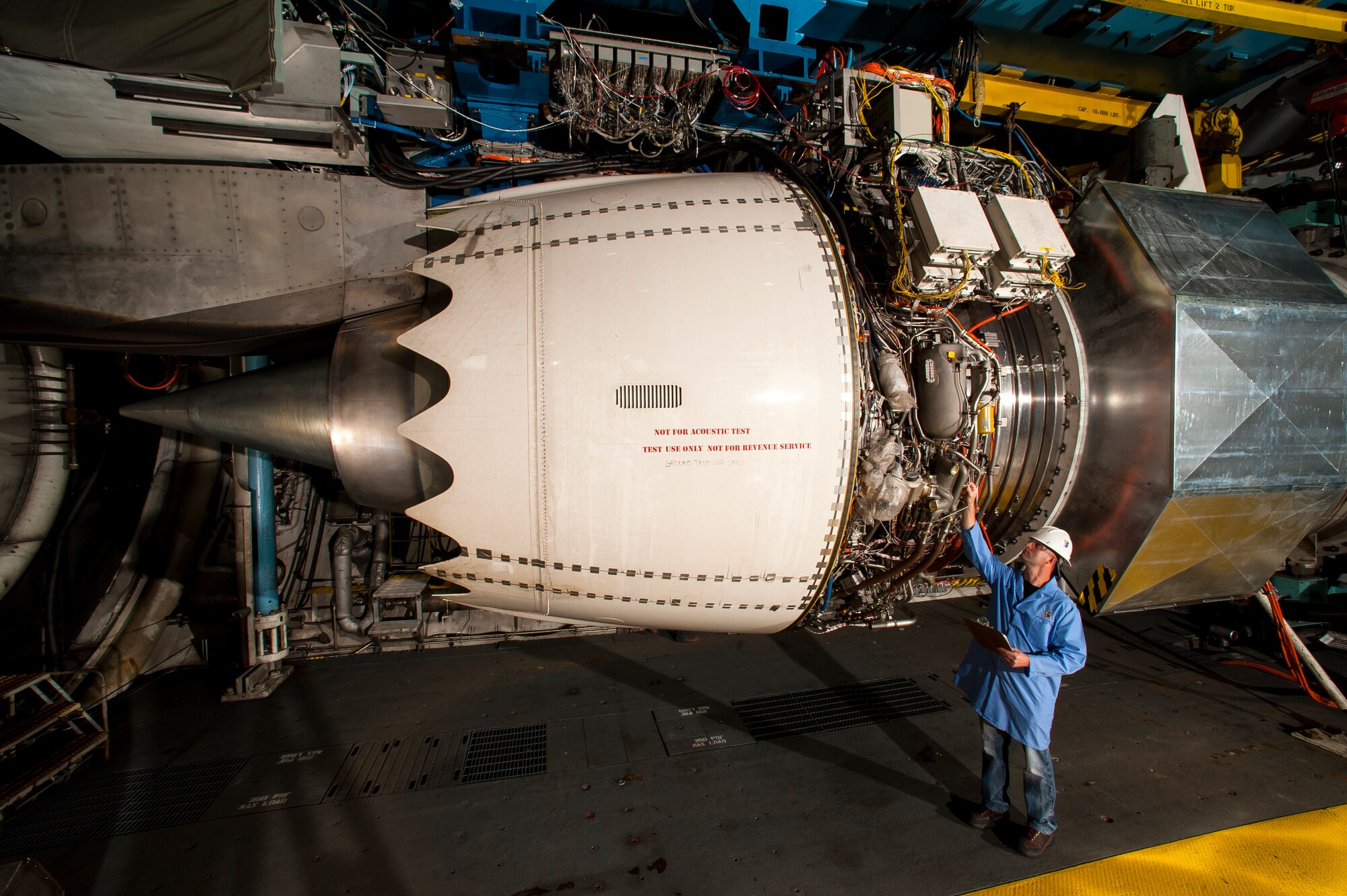EN 334 Turbine Blade Resonance Testing
The EN 334 standard is a crucial document in the aerospace and aviation sector that governs the testing of turbine blades to ensure they are free from resonant frequencies. This test is essential as it helps identify potential failure modes, especially at high-speed rotations where small changes can lead to catastrophic failures.
In the context of propulsion systems such as jet engines or turboprop engines, the design and operation involve high rotational speeds that can cause vibrations if not properly managed. Resonance occurs when a system is excited at its natural frequency, leading to excessive oscillations which could result in material fatigue, cracks, or even total failure.
The testing process involves subjecting turbine blades to various stress conditions simulating real-world operating environments. This includes high-speed spinning and exposure to extreme temperatures and pressures. The goal is to determine the blade's natural frequencies and compare them against the excitation frequencies of the engine during operation. If any overlap is identified, it indicates a potential for resonance which could lead to premature failure.
The process begins with precise measurement of the turbine blades' dimensions using coordinate measuring machines (CMMs) or laser interferometry systems. These measurements are critical as even small deviations can significantly impact the calculated natural frequencies. Once measured, the blades undergo finite element analysis (FEA) modeling to predict their vibrational behavior under different loading conditions.
During the actual testing phase, the turbine blades are mounted on a rig capable of simulating engine operating conditions. The rig includes mechanisms for applying rotational speeds and varying other parameters such as temperature and pressure. Sensors placed along the blade measure displacement, acceleration, and stress during operation. This data is then analyzed to determine if any resonant frequencies align with those generated by the engine.
The results of this testing are documented comprehensively in accordance with EN 334 guidelines. Reports include detailed descriptions of the test setup, parameters used, observed behaviors, and conclusions drawn regarding the blade's suitability for service. Compliance with these standards not only ensures safety but also enhances reputation among stakeholders like airlines, engine manufacturers, and regulatory bodies.
- Key Parameters: Rotational speed, temperature range, pressure levels, resonance frequency ranges
- Data Collection Methods: CMM scanning, laser interferometry, FEA modeling, sensor-based vibration monitoring
- Analysis Techniques: FFT analysis, spectral density plots, modal analysis
In conclusion, EN 334 turbine blade resonance testing is a vital step in ensuring the longevity and reliability of propulsion systems. By identifying potential resonant issues early on, manufacturers can take corrective actions to prevent failures during critical phases of flight operations.
Eurolab Advantages
At Eurolab, we pride ourselves on offering comprehensive testing solutions tailored specifically for the aerospace and aviation industries. Our EN 334 turbine blade resonance testing services are designed to provide peace of mind to our clients by ensuring that all components meet stringent quality standards.
We employ state-of-the-art equipment and software packages capable of simulating real-world scenarios accurately. This allows us to achieve precise measurements necessary for reliable results. Our team consists of highly qualified professionals who understand the nuances of this specialized field, allowing them to provide accurate interpretations of test outcomes.
Moreover, Eurolab maintains ISO/IEC 17025 accreditation, ensuring that our operations adhere strictly to internationally recognized quality management systems. This accreditation guarantees consistency and accuracy in all aspects of our testing services.
A key advantage lies in our ability to offer rapid turnaround times without compromising on the quality of results. We strive to deliver timely reports while maintaining strict adherence to industry best practices.
Additionally, Eurolab offers a range of additional support services including consultation on design improvements based on test findings and assistance with obtaining necessary certifications from regulatory bodies.
Quality and Reliability Assurance
The EN 334 standard places a strong emphasis on ensuring the highest levels of product integrity through rigorous testing protocols. Compliance with this standard is not only mandated by law but also essential for maintaining trust among customers and stakeholders.
- Compliance Mandates: Ensures adherence to international safety regulations
- Customer Trust: Builds confidence in the quality of products
- Regulatory Bodies: Meets stringent requirements set by aviation authorities worldwide
The process begins with meticulous preparation, including thorough cleaning and inspection of each component to eliminate any external factors that could influence test results. During testing, multiple checks are performed at different stages to confirm the accuracy of readings.
After completion, detailed reports are generated summarizing all aspects of the testing procedure along with interpretations of data collected. These reports serve as valuable resources for decision-making processes both internally within companies and externally when presenting findings to regulatory bodies.
Competitive Advantage and Market Impact
By offering EN 334 turbine blade resonance testing, Eurolab positions itself at the forefront of innovation in aerospace and aviation technology. This service offers numerous competitive advantages that set us apart from other laboratories:
- Innovation Leadership: Continuously pushing boundaries to develop more efficient and safer propulsion systems
- Market Differentiation: Providing unique capabilities that enhance brand reputation among clients seeking excellence in engineering solutions
- Prestige and Recognition: Gaining industry accolades for maintaining high standards of quality assurance
- Innovation Partnerships: Collaborating closely with leading companies to drive technological advancements forward
The ability to deliver accurate, reliable results quickly contributes significantly towards establishing Eurolab as a leader in the field. Our commitment to excellence ensures that every project receives individual attention and tailored solutions addressing specific client needs.





